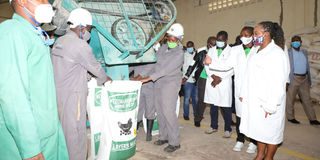Premium
Blow for farmers as costs of feeds hit record high

Kirinyaga Governor Anne Waiguru (right in white dust coat) inspecting Kiaga Animal Feeds Production Factory.
The costs of animal feeds have hit a record high after Zambia banned export of soya and sunflower meals, which are major raw material used in their production.
Zambia is the main source market for Kenya and a freeze in exports is expected to have a negative effect in the coming days, according to the Association of Kenya Feed Manufacturers (AKEFEMA), which has so far seen 15 millers close shop due to high cost of doing business.
The cost of soya has doubled from Sh65 a kilo in August last year to Sh130 currently while sunflower meal has gone up from Sh25 to Sh35.
AKEFEMA now wants the government to allow duty-free importation of GMO yellow maize and soya to ease the current deficit.
“Since this (Zambia) is one of the main source markets for Kenya, the price of little available soya has moved up by over 30 percent resulting in a sharp rise in the cost of producing feeds,” said general Secretary of AKFEMA Martin Kinoti.
The price of a 70 kilogramme bag of dairy meal has gone up from Sh2,500 in August last year to Sh3,400 currently, chick marsh is retailing at Sh4,200 from Sh3,250 while layers is now selling at Sh3,800 from Sh3,100.
The chairman of the association Joseph Karuri said the feeds business will be unsustainable if the government will not offer the intervention that is urgently needed.
The prices of other key ingredients such as wheat bran have also gone up to sell at Sh28 a kilo from Sh18 previously while maize germ is retailing at Sh30 from Sh20 previously.
AKEFEMA notes that in the last six months there has been a serious scarcity of sunflower seed and cottonseed cake with no indication yet that the situation will improve in the next couple of months.
“We are therefore appealing to the Government to allow the feed industry to import soya bean meal from the world market, including from GMO producing countries,” said AKEFEMA.
Kenya does not produce sufficient stocks of soya and sunflower cake and mainly relies on imports to fill the deficit.
The high cost of feeds has seen farmers and breeders cut down on the size of their animals to minimise on losses.
Robert Muchugia of Isinya chicks said they no longer operate as they used before because of high cost of production.
Zachary Munyambu, a farmer with Kiambu poultry cooperative said their members have had to abandon chicken farming because of losses occasioned by high cost of production.





